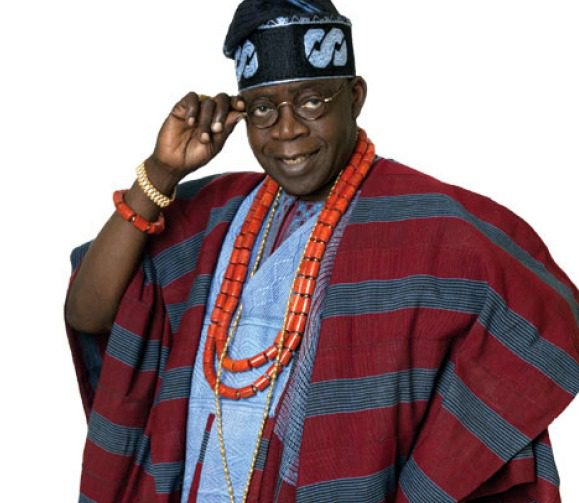Democracy & Governance
Seeing Tinubu’s Presidency As A Lesson For Everyone On How God Makes a Leader -By Isaac Asabor
You might have asked, “Why was David promoted, and not someone else? It is difficult to understand but one fact is clear. The fact is that God appointed David because he will do what God wants him to do. Thus, besides being well educated, being a teetotaler, and being an Angel, before God makes anyone become a leader, he or she will need to love God and the people that surround him.

How can democracy be at the service of the best candidate; a candidate without blemish; a candidate that is not morally bankrupt? Does the very word, “Democracy”truly mean government by the people if the electorates cannot exercise their voting rights to decide who leads them as president in any given political dispensation? This is certainly what democracy ought to be because were taught that as a political system or machinery, it is operated by the people. And yet the political system of Nigeria, which boasts of being democratic, coexists quite comfortably with the most undemocratic economic structure, in which a smaller and smaller group of millionaires and billionaires owns and controls more wealth than the vast majority at the other end of the social spectrum.
Anyone who has been pondering over how the last presidential election in Nigeria went, particularly about how the then Mr. Bola Ahmed Tinubu emerged as the winner must be struck by this seeming contradiction. But a closer look at how Nigeria’s electoral system has functioned since 1999 when the ongoing democratic system of government was adopted shows that there is no contradiction. The kind of democracy that exists here has been very well-suited for perpetuating the rule of a privileged few while giving the appearance of being at the service of all the people.
Thus, the word “democracy” in Nigeria arguably refers to the kind of political system prevalent in much of the capitalist world today. To this writer, “Democracy” is somewhat of a “Free Market” which stands as a pedestal for the privileged few to stand on for a form of government that is as much for sale as the commodities around which economic life is centered.
Thus, with each passing political dispensation, not a few Nigerians witnessed how presidential elections are prepared for as billions of Naira are raised by the candidates from their moneyed godfathers and an array of supporters to make the exercise look like what could contextually be called an “Electoral Market” where the wealthiest gets the highest vote. What should anyone expect in a market where virtually every stakeholder can be bribed to compromise his or her conscience?
As venal as this democracy may be, however, the process whereby the wealthy capture the votes of the many is not simple. History can never be scripted, and life is full of surprises. While most Nigerians erroneously think that the candidates with the most money behind them usually win, political history has also shown us that there are exceptions to that rule. The reason for the foregoing cannot be farfetched as mass struggles will impact elections, even though these struggles are usually resolved through other means. For instance, at the death of the leader of the Yoruba people, Chief Ọbafemi Awolowo in 1987, Emeka Ojukwu, in a tribute, described him as the “best President Nigeria never had.” In a similar vein, it is no more news that following the declaration of Bola Tinubu of the All Progressives Congress (APC) as the winner of the February 25, 2023 elections by the Independent National Electoral Commission (INEC), that Peter Obi of the Labour Party, who came third, proceeded to court, demanding the cancellation of the exercise. The foregoing are the most prominent, or resounding electoral outcomes that can be made reference to in this context to buttress this writer’s view. Similar instances abound at every stage across electoral constituencies.
As a Christian, it is expedient I make this opinion more explanatory by opining that after a Carpenter selects the boards he wants for a project he would take the measurements, cut, smooth, and shape them. Sometimes the board requires him to do extensive work to get it to the condition he needs for the project he is creating. Normally, there would be defects to remove any imperfections to work around. Often there would be grain patterns of beauty that he would want to highlight and emphasize. Being a creative endeavor, there is no denying the fact that the actiontakes time and requires effort.
In a similar vein, when God makes a leader he measures, cuts, and smooths slowly and purposefully so that such leader becomesa godly leader for his glory and his Kingdom. Without a doubt, God is by each passing minute involved in this process in everyone’s life even when such people are oblivious to the fact that God exists. Mind you, God does not mind whether anyone sleeps in the church or mosque 24/7 or not. In my own conviction, God is the father of everyone. He does not discriminate, even when you did not know that he loved you, and even when you did not care about him at all. The key for us is to realize that time, pain, pressure, and even failure are among God’s primary tools in shaping leaders.Many times the history of our lives has been the knife that God has used to carve and shape us so that we are sensitive to others and submissive to him. These difficulties force us to focus on God alone and learn to find our full sufficiency in him.Thus, Paul the Apostle can say that the difficult thorn in his flesh is actually a blessing of good (2 Corinthians 12:7-10).The hardships of life protected him from pride that would lead to his failure as a disciple and a leader.
Given the foregoing, it should no longer be difficult for anyone to be seeing Tinubu’s emergence as today’s president of Nigeria as a lesson on how God makes a Leader.
At this juncture, it is expedient to opine that man always looks to someone who appears to be strong and has leadership qualities. In any group, someone rises up to lead the pack, whether he or she is the loudest person in the classroom, the one most professional in the office, the one who sounds “anointed” in church, or simply the one who is most vocal among our peers. Unfortunately, man’s criteria for choosing a leader most often, if not always, differ from how God chooses someone whom He wants to lead His people. “What does He look for in a leader anyway?”
The answers to the foregoing questions cannot be farfetched when it is seen from the perspective of the fact that when we humans choose a leader without knowing what God wants, it is expedient we look out for certain qualities in a leader: We look at his experience which may dwell around his antecedent and background as a political leader, even as we will look at the level of his knowledge or skill as we resort to being querying the authenticity of his or her certificate. We may even begin to question whether he or she is a leader that is tall or big and someone who is vocal about his opinions.
Let us admit it: We almost always look for a good-looking and nice person to be our leader. Sadly, this is not how God chooses a leader.
For those that are in Christendom, looking at how God appointed David should speak volumes, particularly as he was that young shepherd boy, and as leader of Israel. God commanded Samuel to appoint the next king of Israel, as stated in 1 Samuel 16:7,
“Do not look at his appearance or at the height of his stature, because I have rejected him. For the Lord sees not as man sees. For man looks on the outward appearance, but the Lord looks on the heart.”
Contextually put, we can learn from the story of Tinubu as the incumbent President of Nigeria that God does not choose leaders the way we do. The reason for the foregoing cannot be farfetched as we were looking for a president that was robustly healthy. We were looking for a president that never smoked or drank throughout his life even as Bode George, a Peoples Democratic Party stalwart was searching for the leader he played with as a teenager. The childhood friend whose parents he has gone on errands for. The childhood friend he saw as a teenager running around the streets.
Disappointingly, God sees the heart of man. No matter how much we learned or trained ourselves to be a leader, our skills would not cut it with God. He sees our hearts, and looks beyond the externals to proceed to what really matters: What is inside us. So what should we have inside of us that would make God want to use us to lead His people?
In 1 Samuel 13:14, we find Samuel talking to Saul, the deposed king, about what God wants: “But now your kingdom will not continue. The Lord has sought for Himself a man after His own heart and the Lord has commanded him to be prince over His people because you have not kept that which the Lord commanded you.”
In fact, God does not want someone with skill or stature. He wants someone who loves Him and seeks His heart above all.
OK, so you say you love God and seek Him, but He does not make you a leader yet. There’s one thing that’s missing, one thing that God really wants in a leader. In Acts 13:22, we read Paul testifying why God chose David:
“When God had removed Saul, He raised up David to be their king, of whom He testified, saying, ‘I have found David the son of Jesse, a man after my own heart, who will fulfill my entire will.
You might have asked, “Why was David promoted, and not someone else? It is difficult to understand but one fact is clear. The fact is that God appointed David because he will do what God wants him to do. Thus, besides being well educated, being a teetotaler, and being an Angel, before God makes anyone become a leader, he or she will need to love God and the people that surround him.
At this juncture, if you ask this writer what life lessons Nigerian need to learn from Tinubu’s emergence as the president of Nigeria, his answer will be “Nigerians must always rely on the Lord’s strength, not their own”, this is as Psalm 20:7 says “Some trust in chariots, and some in horses; But we will remember the name of the LORD our God”, “Trusting the Lord means resting in Him and letting Him do the work”.
In a similar vein, Psalm 94:17–18 says, “Unless the LORD had been my help, My soul would soon have settled in silence, emphatically as verse18 says, “My foot slips,” Your mercy, O LORD, will hold me up”, and again Isaiah 25:4 says, “For You have been a strength to the poor, A strength to the needy in his distress, A refuge from the storm, A shade from the heat; For the blast of the terrible ones is as a storm against the wall”.



















